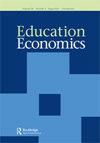恐怖主义对继续教育的影响:来自巴基斯坦的证据
IF 0.9
Q3 Social Sciences
引用次数: 0
摘要
摘要教育对个人和整个社会都有广泛的好处。这篇文章调查了恐怖事件对家庭是否可以继续让孩子上学的影响。通过使用全球恐怖主义数据库和巴基斯坦的社会和生活水平衡量,我们发现,持续接触恐怖主义大大降低了父母继续子女教育的可能性。结果表明,每100万人中,恐怖事件的增加导致继续接受小学教育的儿童减少26501人。我们还审查了不同人口群体和恐怖主义袭击类型的结果。本文章由计算机程序翻译,如有差异,请以英文原文为准。
The effect of terrorism on continuing education: evidence from Pakistan
ABSTRACT Education has wide-ranging benefits to both the individual and wider society. This article investigates the consequences of terrorist incidents on whether households can further their children’s schooling. Using both the Global Terrorism Database and Pakistan’s Social and Living Standards Measurement, we find that persistent exposure to terrorism significantly reduces the likelihood that parents will continue their children’s education. The result suggests, that for every million people, an increase in terrorist incidents causes 26,501 fewer children to continue their education at the primary school education level. We also examine the results by various demographic segments and types of terrorism attacks.
求助全文
通过发布文献求助,成功后即可免费获取论文全文。
去求助
来源期刊

Education Economics
EDUCATION & EDUCATIONAL RESEARCH-
CiteScore
2.00
自引率
8.30%
发文量
38
期刊介绍:
Education Economics is a peer-reviewed journal serving as a forum for debate in all areas of the economics and management of education. Particular emphasis is given to the "quantitative" aspects of educational management which involve numerate disciplines such as economics and operational research. The content is of international appeal and is not limited to material of a technical nature. Applied work with clear policy implications is especially encouraged. Readership of the journal includes academics in the field of education, economics and management; civil servants and local government officials responsible for education and manpower planning; educational managers at the level of the individual school or college.
 求助内容:
求助内容: 应助结果提醒方式:
应助结果提醒方式:


